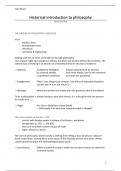Cato Sluyts
Historical introduction to philosophy
Gerd Van Riel
THE ORIGINS OF PHILOSOPHY 21/02/2023
Myth
• mythos, story
• foundational event
• noncritical
• normative & legitimizing
Dealing with loss of sense and evidence through philosophy.
Loss of grips might have dangerous effects, but also have positive effects like creativity. The
rational way of thinking is an answer on a theoretical level on this loss of evidence.
-> Rational: a) objective intelligent (implies objectivity of an answer)
b) universal validity (not mean always, but for this moment)
c) systematic ordaining (act upon our questions)
-> Engagement: Plato’s cave allegory (to compare "the effect of education (παιδεία)
and the lack of it on our nature")
-> Ideology: where the answers are louder than the questions (this is a problem)
To be a philosopher is always having to deal with history. It is a discipline that can present
its results on a ………
-> Hegel: Ihre Zeit in Gedanken erfasst (book)
= “philosophy is its own time comprehended in thought”
The cultural shock of the 6th c. BCE
• contact with foreign people’s critique of anthropo – morphism
• Xenophanes (c. 570 - c. 478 BCE)
• from oral to written culture critique of myth
• logos: discourse, reason
The start of philosophy: Greek society is shifting from telling a story (myths) to rational +
Greek imperialism, causing them to be aware of the relativity of their own views. Which
caused questions about the methodological godly world.
-> Levy Strauss: Within a mythical society a myth has the same function as rational in
a rational society.
1
,Cato Sluyts
Greek poets: Homer, Illias (8th century BC); and Hesiod, Theogonia (7th century BC)
-> By telling a story you make it present again.
Logos ratio
physis natura
supranational nature
-> first philosophy: cosmology (cosmos = beautiful to look at + ology = knowledge) = order
2
,Cato Sluyts
THE ORIGINS OF PHILOSOPHY 28/02/2023
The “pre-Socratic” philosophers
• Materialism
• Looking for the arkhè (ἀρχή):
• 1ste principle = prime matter
• Discovery of
o Logos (“discourse”)
o Physis (nature)
o Kosmos (“gem”)
o Theoria
• The 7 sages (sofoi)
The knowers stating things regarding war, crops, etc. were called the sophoi (the wise).
-> Thalis predicted the solar eclipse and the return of the sun in 585 BC. And stated that
everything is what it is because of water.
Theoria comes from thea (to watch) + horan (to see), meaning ‘sightseeing’. It is looking at
nature without searching for a use, but with the sole purpose of knowledge.
Theoros is one that visits a place to look at what is to be seen, from an outside viewpoint.
They are non-participating observers.
-> Herodotus states that that is what distinguishes the Greek from others, like Egyptians,
who only studied things such as mathematics, geometry, astronomy, etc. for practical use
instead of its own sake (knowledge).
“Being” versus “Becoming” (materialism)
Heraclitus (c. 545 - c. 480 BCE)
• “Everything flows and nothing stays”
• Permanent change
• Conflict of opposites
The world is a permanent, endless existence, keeping itself alive as a model of change. It has
no beginning nor end. However, there is no state of rest, the world is continuously in motion
Everything is in constant flux (panta rei), change is ever present, but nothing is for eternity.
Because of the tension between opposites the cosmos has an ordered structure and is
beautiful. This cosmos may last forever but owes its existence to the opposite forces and
will therefore never stay the same.
Parmenides (c. 515 - c. 440 BCE)
• “It is or it is not”
• No coming to be/perishing
• Identity
3
, Cato Sluyts
• Immobility
• Perfection
• Spherical shape
• Aristotle’s criticism
Principles of knowledge = principles of being
Everything either is or isn’t. if you say there is; you have to accept the consequences, if you
say there is not; you are stating non-existence and that is the final word, you stop there.
Qua being is something that is. There is no abstract notion of being. Everything that is, is
because it exists (sensible objects).
(1) There is difference because you trust your instincts and senses, you should distrust
these. Reality is to be excessed by senseless perception. You should only use your sense to
point out senseless things (qua being), implying that there is no such thing as change.
(2) Qua being is the whole of nature, it does not belong to anyone. Nature is an organism
that never changes in its existence, changes on its surface doesn’t affect nature as a whole.
The same goes for the fact of being, a being is always going to be identical.
(3) Qua being is one identical whole without motion, it is immobile.
(4) ………………………………………………………Heidegger……………………………
(5) the sphere is a perfect mathematical body in the sense that it is perfectly symmetrical
with no beginning nor end, but it stays a qua being, a material thing.
Aristotle has criticism on this theory of Parmenides since he is pointing out the principles of
being as a scholar, not as natural philosophe. He is not talking about nature because nature
is an ever-changing thing. He is actually talking about metaphysics.
The Beginnings of Ethics
• The sophists Protagoras (490 - 420 BCE) vs. Socrates (470 - 399 BCE)
• Relativism vs. Truth
• Rhetoric vs. Wisdom
Draco institutes the monopoly of the state in terms of violence (to stop family feuds, blood
revenge, etc.) ending the traditional way of dealing with responsibility.
Clisthenes states that in order to organize the state you don’t need family ties anymore (not
in the context of revenge, status, etc.). Every one of the 10 districts will now be represented
by elected representatives. (First form of ‘democracy’ but male, citizen, over 25, free = 5%).
You were ruled based on where you were instead of who you(r family) are.
4




